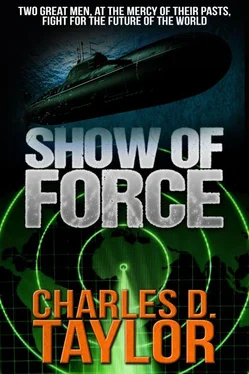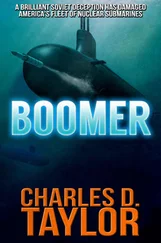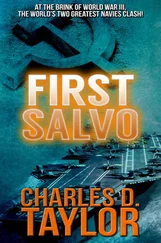A pinwheel is an insidious scheme in the eyes of a submariner at two hundred and fifty feet. By intuition and a bit of listening, the ships above can be pinpointed, but their constant movement creates confusion. Just like a child's toy pinwheel, the ships move on the four compass points in a circular motion around their contact adjusting their position relative to each other as the sub changes its course and speed. And hovering on the outer perimeter, a couple of miles from the destroyers, were helicopters in a similar circle of their own with sonars lowered into the water below. The submarine that thought it had effected an escape from the ships would be doubly surprised to hear the familiar ping on its hull when no ship's noise was evident. And even farther off, fixed-wing aircraft were sewing lines on sonobuoys that bobbed inoffensively in the water. They relayed the movement from below to their parent aircraft, allowing cross fixes that gave the course and speed of their contact. The forces under Sam Carter's command were formidable, to say the least.
Darkness was beginning to replace the softness of dusk. "Captain," David reported, "the gunnery officer reports that the men m the gun mounts are awfully hot and cramped… request permission to open the hatches on the mounts for a few minutes."
"Permission granted. And ask damage control to wake up the supply officer. I want coffee and sandwiches for the crew before it's too dark out here… and have them bring some milk, too, for some of the youngsters," he grinned.
The crew ate on station as best it could that evening, and found some relief as watertight restrictions were lifted for a few moments to receive trie food that was passed in to them. Darkness brought an increase in the force of the wind, enough so that whitecaps would have been evident if it had been light. A few times, Carter had sonar relay his request for the sub to surface and identify itself according to international law. He was not surprised by the sub's silence, nor its continuing efforts to evade his pinwheel.
Once again, Carter went to the ship's PA system. "This is the Captain speaking again; As you've no doubt heard, we are circling what we believe to be a Russian diesel submarine. Two of them were reported in the area in the last couple of days. Neither of them was able to refuel from its cow, since our carrier planes were escorting it. Our orders, which have been relayed from Washington, are to stay with the sub until it is on the surface. I do not expect anything other than a peaceful surfacing. We are not at war, and God forbid that we ever have to be. There will be no forceful acts on our part unless we are provoked. Each of us is responsible to Mr. Kennedy in his own way to ensure his orders are carried out peacefully. If it becomes necessary, we will wrap grenades in toilet paper, the same as we've done during exercises with our own subs, to make our point. I don't expect him to get away. As a matter of fact, I hope we'll be steaming alongside him tomorrow morning, though I don't think there will be time to exchange souvenirs."
He was interrupted by David Charles. "Sub's dead in the water, sir. Wait one… funny noises in sonar. Mr. Welles believes he's increasing his depth. He may be trying to find a temperature layer down there."
"David, tell the gun boss to have some grenades brought down aft. The least we can do is make it uncomfortable for him."
A few moments later, when David reported the grenades ready, Carter ordered. "Tell them to drop the first one in thirty seconds and then two more after counting to fifteen each time, as we pass over him. And make sure Welles knows when we're dropping them. I don't need an ASW officer or sonarmen with punctured eardrums." He turned to Collier, "Tell the other units over pritac what we're doing. I don't want to have some other CO trying to deck me in the "O" Club the next time."
The noise of an underwater explosion is compounded since water tends to hold that sound, as opposed to air, which rapidly dissipates it. A grenade going off underwater may sound like a cannon shot to those nearby. Within a submarine, the explosion is magnified to the point that an untrained crew, or one with little experience, will think they have just been hit. The purpose of the toilet paper is to ensure that the sub's crew is kept as nervous as possible. The paper will gradually disintegrate as the grenade floats down until the handle releases, still taking a bit more time before detonation. A light wrapping of paper will bring an explosion at about 100 feet, while a gunner's mate with experience can wrap the grenade so that it might go down as far as 250 to 300 feet, or more. The deeper the water, the greater the pressure, the louder the bang… all that effect for the price of a grenade! Welles estimated the sub to be at about 300 feet, and the grenade was wrapped by an expert.
It was extremely humid in the cramped submarine. The water temperature outside was cool enough so that heat wasn't the problem. But the combination of humidity caused by the always leaking water, and the increasing closeness of the air, made comfort of any kind impossible. Alex Kupinsky had no concern about his crew cracking under the strain. They were all hand-picked, as was he, and they offered no complaints. The most difficult problem for all of them was the fact that they didn't know yet what had brought about the apparent conflict with the United States, nor were they sure of the intentions of the American destroyers. The unknown was their greatest enemy.
The chief engineer had just reported that the fuel pump was acting up again, and that the air supply was good for a little more than five hours. And the bearing on the shaft was heating up again. He could not guarantee to his captain that it would last the night. If it reached a certain temperature, then they would have to shut down the shaft or risk it warping at 300 feet. Each of those problems were considered separately by Kupinsky. The fuel pump could be a problem later. He would try to keep his speed down except for a couple of rapid changes, especially if he could find a temperature gradient. The air supply was his major concern. While they could stay down for another five hours, the greatest problem was that the men's efficiency would decrease at a certain point, and then he might just as well surface. Since he was the only one aboard the boat with any knowledge of English, he understood the Americans on the underwater telephone saying they would hold him down until he had no choice but to surface. Then the grenades, which were indeed expertly wrapped, began to explode at the same depth as his boat. It was the worst of times to be facing the unknown.
"Tell Frank to request them to surface again. They've had time to think about those grenades now," Carter nodded to David. The whitecaps had now grown into waves that were large enough to make the many course changes uncomfortable. One advantage, David knew, that a submarine had was the smooth weather underneath, but he decided he'd rather be on the surface at this point.
There was no answer to the grenades, nor to any of the repeated requests to surface. The night drew on and the men grew tired. They had been at their stations since before 1800, and it was now almost midnight. Six hours… any response would have raised their spirits, but it is difficult to perform consistently when there is no evidence that your efforts are having any effect.
"It's tough for them down there now," Carter began to nobody in particular. "It stinks in that sub, a lot worse than in CIC or main control. The air has been breathed by too many people too often, and it doesn't taste good at all. And I understand from submariners I've known that you get a headache after a while, a throbbing one that doesn't go away." He knew everything he was saying would be relayed by the various talkers on the bridge to the other stations. "And can you imagine what it's like when those grenades go off? Which reminds me, David. Have them drop five more this time. Same precautions as usual." After he was satisfied that his orders were being carried out, he continued, "I don't mind telling you… the noise those things make when you're inside one of those boats.… No, sir, friends have told me when they came back to Pearl from a mission that half the stink in the boat was the shit in their skivvies." He went on and what he was saying passed through the ship, and he knew that shortly the men on the Bagley would stop worrying about themselves. They would respect their enemy's position.
Читать дальше












